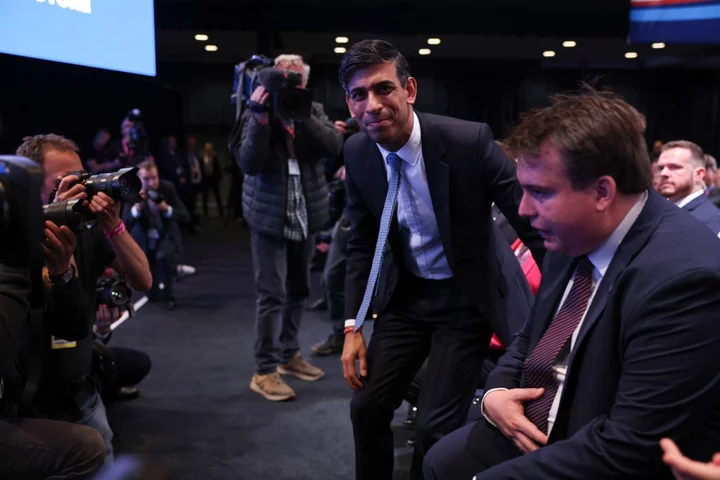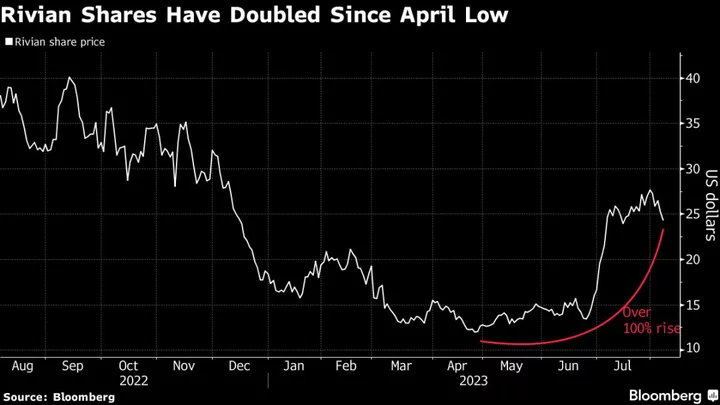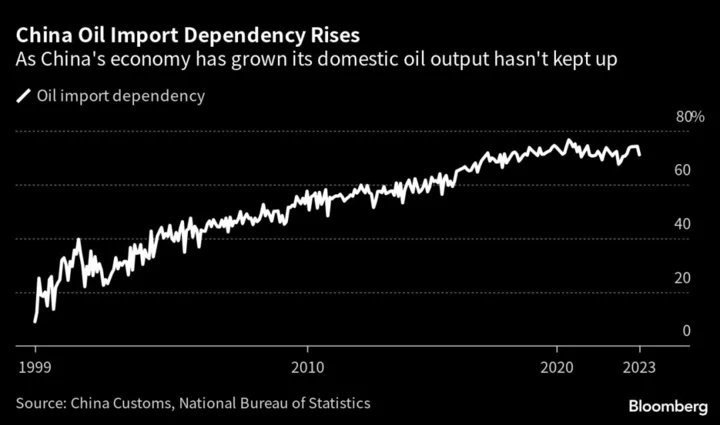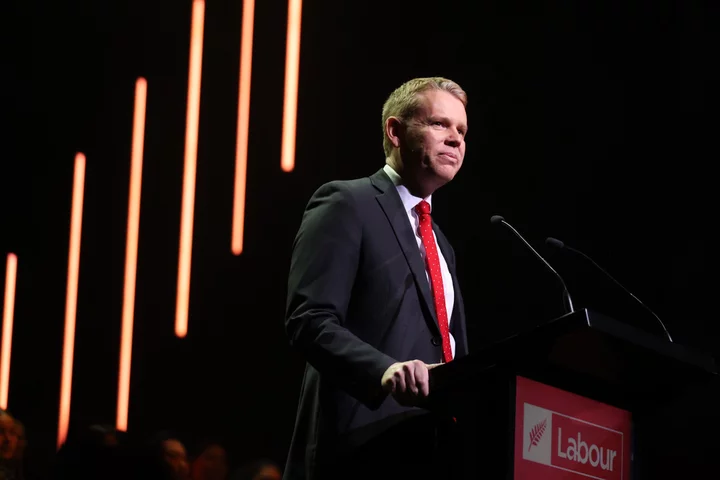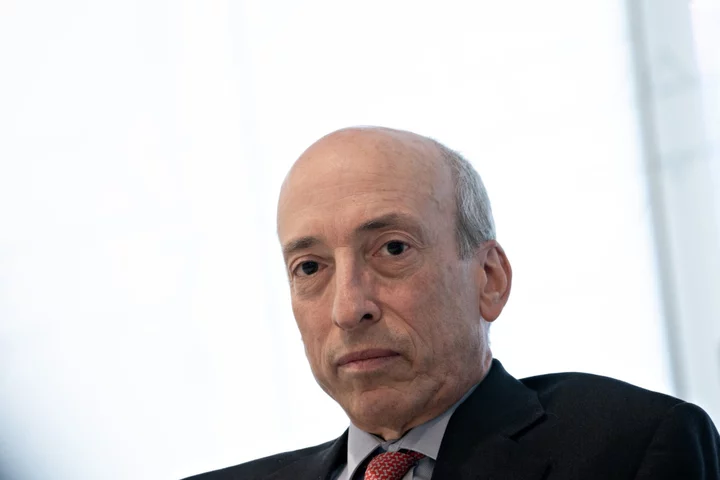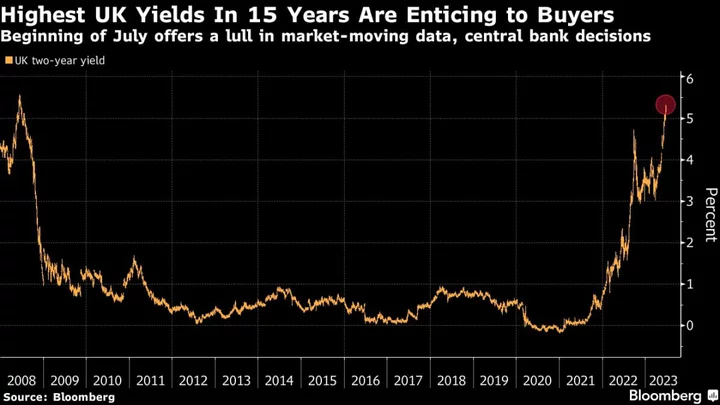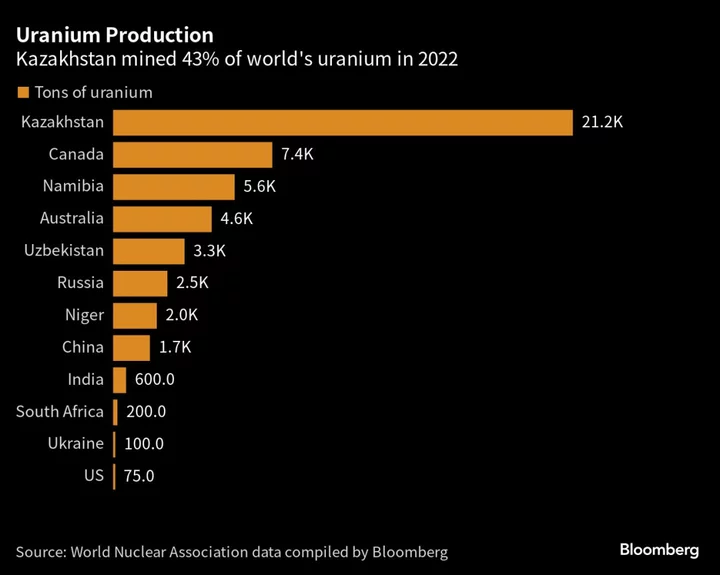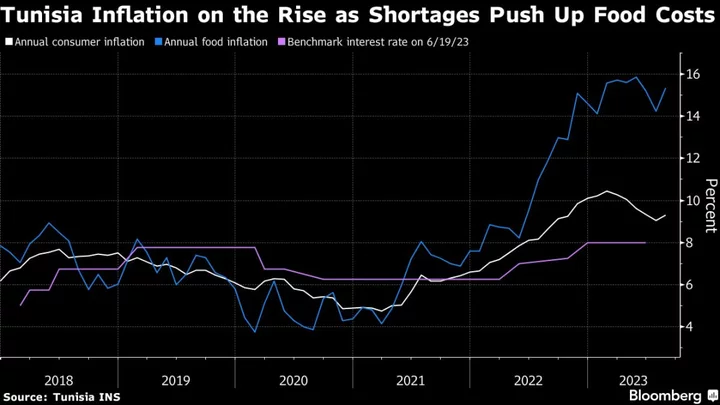Rishi Sunak unveiled a new campaign slogan at this week’s Conservative Party conference: “Long-term decisions for a brighter future.” Yet the convention has been overshadowed by three the UK prime minister has so far been unable, or unwilling, to take.
While he may do so in his leader’s speech on Wednesday, the void has led his own top team to question if Sunak is the one to lead them much longer into the future he’s suddenly so keen for voters to think about.
A contentious call on whether to ditch a major section of Britain’s planned high-speed rail network could come as soon as Tuesday. Sunak’s refusal to commit to building the line to Manchester, where this week’s conference is taking place, has caused huge political damage. A person familiar with the matter said Sunak could use his speech to announce it.
Sunak’s faltering progress on cutting immigration has caused pro-Brexit Cabinet ministers to publicly suggest the UK could leave the European Convention on Human Rights to enable deportation flights to go ahead. People close to the prime minister say he has yet to take a definitive view.
Tax cuts are what much of the Tory base is calling for, especially on the right of the party. Liz Truss wants the focus to be corporations, and hundreds turned up to hear the 49-day premier speak on Monday.
Again, Sunak’s government is non-committal. Chancellor of the Exchequer Jeremy Hunt told Bloomberg there is no fiscal headroom to cut taxes now and he doesn’t yet know if he can do so in time for the next general election, which is due by January 2025.
All of which has led to a subdued conference. On one level, that’s likely to be a relief compared with the fireworks a year ago, when Truss left the annual gathering with her premiership looking fragile after a U-turn on a major tax cut.
But it’s also done nothing to ease doubts that Sunak can overturn a polling deficit of about 20 points with the Labour Party. Ministers have spent large chunks of their speeches attacking opposition leader Keir Starmer.
During so-called fringe events on the sidelines of the main conference, and at private dinners with business leaders and over drinks in Manchester’s hotel bars, members of Sunak’s party have unsubtly jostled for position in a future leadership contest if the Tories lose the election.
Home Secretary Suella Braverman made her ambitions clear in an interview talking up her right-wing credentials with the Mail on Sunday newspaper. Business Secretary Kemi Badenoch, who is also on the right of the party, then suggested the UK could leave the ECHR to enable the government’s policy to enable deportation flights to Rwanda. Her top ally, Leveling Up Secretary Michael Gove, quickly took the same view.
The Tory right, though, is a crowded space. Former Home Secretary Priti Patel hit out at what she called Braverman’s “attention” seeking before declining to rule out running for leader in future herself.
One Cabinet minister left attendees at an off-the-record Sunday night dinner in no doubt that they saw themselves as a future party leader, as they criticized half-a-dozen current government policies. Another aide had to laugh as they toed the line that Sunak can win the election.
Sunak’s aides insist they are relaxed by the positioning, arguing it’s par for the course at these conventions. Other loyalists are irritated, with one Cabinet minister suggesting their colleagues needed to focus on fighting the election, not dividing up the spoils of defeat.
For Tory moderates, the question is more of an existential one as Sunak and his Cabinet increasingly push more right-wing policies and talking points to rally the party base. Transport Secretary Mark Harper’s “proudly pro-car” agenda leaned into conspiracy theories around so-called 15-minute cities.
Meanwhile, Security Minister Tom Tugendhat noted that his right-wing colleagues’ calls to leave the ECHR could undermine the Northern Ireland peace process, given it is written into the 1998 Good Friday Agreement.
“Don’t throw around words unless you can answer the questions,” Tugendhat told Times Radio.
“The danger of this core vote strategy, and sending those sorts of signals, is we don’t actually know how big the Conservative core vote is,” Will Jennings, politics professor at the University of Southampton, told Bloomberg. “The danger of that core vote strategy is that actually the core vote is much lower than people expect.”
Still, Sunak’s closest aides take a more optimistic view about how the conference is going. The premier is happy and this week could be a turning point politically, one ally said. Another pointed to a recent poll which put Labour’s lead at a reduced 10 points. If Sunak can get through the rest of the convention unscathed, and other opinion surveys also show a tightening, pressure will build on Starmer, they said.
That would lead to pushing harder on policies aimed at pleasing the Tory base, they said. Sunak has announced a clampdown on 20 miles per hour (32 kph) speed limits, a slowdown of Britain’s efforts to reduce carbon emissions from petrol and diesel cars, and is considering a range of other policies that could create divides with Labour, the person said.
The events of the last few weeks have shown the election is all to play for, the aide insisted. Tory lawmakers and members remain unconvinced.
--With assistance from Ellen Milligan and Joe Mayes.
Author: Alex Wickham, Emily Ashton and Kitty Donaldson

